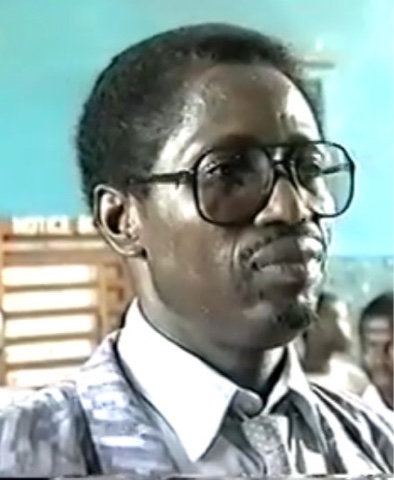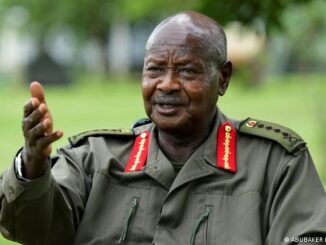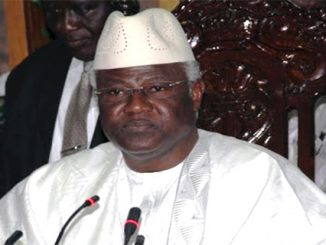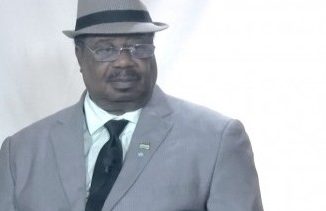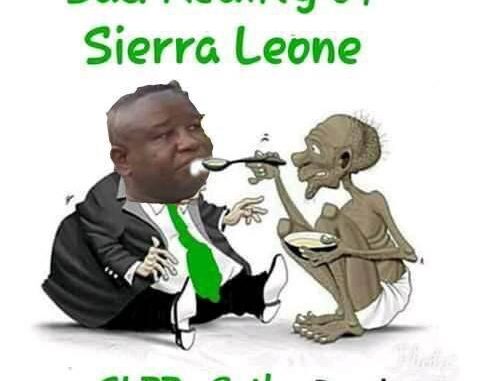
Hilton Fyle on Sierra Leone Politics: 👇👇👇👇👇👇👇👇
MALADY OF THE S.L.P.P. – By Hilton E. Fyle
In 1992 the APC government was overthrown. Shortly afterwards, I exposed their unsavoury actions to the world. Now that the SLPP has also been rebuked by the people in democratic elections, and a reformed and repentant APC government is making unbelievable strides with the help of God (Allah), it is time to address the SLPP and its own history. The people of Sierra Leone are praying now that no longer would God allow bad politicians to hijack their wealth, and poison their future. If this medicine of exposure can work for the APC, then, why not the SLPP?
Let us start at the beginning, and the events that led to Sierra Leone’s first ever military coup.
The year was 1967. The general election was finished. The SLPP had been defeated. The citizens had voted against the tribalization of the civil service, and against corruption in high places. Prime minister Albert Margai and his companions – R.G.O. King, Kandeh Bureh, Berthan Macauley, Mr. Decker, and Tejan Kabbah had transformed Sierra Leone from a paradise of peace, unity and consensus (crafted by his patriotic predecessor Sir Milton Margai), into a retreat of pain, poverty, and disunity.
The APC had a clear lead in this election, at least three parliamentary seats ahead of the SLPP. But the SLPP was unwilling to go. After some delay, manipulation, and conferring by the captains of the SLPP, and with the APC poised to celebrate their victory, the government-controlled Sierra Leone Broadcasting Service (SLBS) announced that the SLPP and the APC had picked up an equal number of seats, because certain paramount chiefs – an independent, non partisan group – had declared for the SLPP. The people of Freetown and APC supporters erupted with protests, against what they saw as a clear case of election fraud.
How did the SLPP government respond? The head of the army, Brigadier Lansana, went on radio to announce that the army was taking over until further notice. The election results were set aside, Martial Law was declared. Three days later Lansana was overthrown by lower ranked officers, and shot dead. A year or so after that, certain soldiers of a divided Sierra Leone army struck again, a fourth military coup, this one against Juxon Smith’s military regime; it was staged by patriotic soldiers of the lowest ranks. Their action led to a return of justice and fair play. The ousted Governor General (The head of state) Banja Tejan Sie was reinstated, and he invited the APC to form the new government.
Where was Ahmed Tejan Kabbah, who had cut some of the illegal business deals for Sir Albert and company? He had fled. Unlike former Prime minister Albert Margai, he did not appear before the Commission of Inquiry to answer charges related to his activities while in office. The Tejan Kabbah was found guilty of corruption in absentia. The trial judge also ruled that Tejan Kabbah should not hold any public office in Sierra Leone in the future. Guess who set aside that order? It was Joseph Momoh, the APC president who succeeded Siaka Stevens. He told Tejan Kabbah that all was forgiven, and invited him to return to his homeland. Tejan Kabbah accepted the presidential pardon, returned to Sierra Leone, and with the help of his friend Solomon Berewa (according to inside information), bribed his way past superior contenders, to become the SLPP’s presidential candidate for the 1996 general election in Sierra Leone.
The election of 1996 was unlike any other. A civil war was raging; tens of thousands of displaced, distraught and impoverished war victims were pouring into the capital, with tearful stories of carnage by RUF rebels, or by soldiers, or by unidentifiable raiders. The NPRC military government of Valentine Strasser and Maada Bio had continued the fight against Foday Sankoh, but now they were being persuaded by the International Community and Sierra Leonean politicians, to bow out, and leave the job to an elected civilian government. Elections were the answer, their advisers told them. But who were these advisers? The National Security Council, the NPRC’s team of top advisers, was headed by Tejan Kabbah, Solomon Berewa, George Banda Thomas, and other SLPP elements; APC politicians were now in disgrace, so these men were now the trusted friends of the NPRC…or so the young NPRC leaders thought. Given the turn of events as the years unfolded, would it be untrue to say now, that the sole aim of these advisers was to see the SLPP back in power, by deceiving the NPRC, and ignoring the suffering of the nation’s war victims?
I was editor of 1-2-3, a Freetown newspaper at this time, and founder of The Peace Before Election campaign (PEBEC). Nearly every week I received a copy of an underground newsletter attacking the NPRC military leaders…their tribal composition, their pay, etc., but not their policies and actions. I asked myself, Who else could organize and profit from this campaign of disaffection, if not the SLPP?
Here is more evidence. In 2004 on several occasions, I met certain former NPRC leaders in the USA, where I now reside. They told me that President Tejan Kabbah and others had betrayed their trust; they did not realize then, that they were being deceived. Their former advisers were now ruling the land; the SLPP government was led by Tejan Kabbah ( president), and Solomon Berewa (elevated from Attorney General and Minister of Justice to Vice President), who was the power behind the throne. Now these young men knew the truth.
Did the civil war die down, once the SLPP government came to power? Not a bit. Why? Because ending the war was not their priority. The most urgent thing for them, was to do what the APC had done: clear all the obstacles, and settle down for a long stay in power.
Sam Hinga Norman, who had armed and who led the Kamajors, was appointed minister of Defence. His openly declared aim was to elevate the Kamajors to official military status ….they are the SLPP’s armed militia. Hinga Norman visited my radio station one day, and showed me a chart of the top commanders of the Sierra Leone army, and the tribal origin beside each name. He said to me, “Our people are not there. We have to change that.” At the same time, soldiers were calling on me to report off the record, that the Kamajors were running a campaign of summary executions against soldiers of the army in certain provincial areas. They were stopping buses and trucks, forcing all identifiable soldiers to disembark, and shooting them. Nobody was doing anything about it, said the soldiers, and they were running out of patience.
But what could Hilton Fyle do? My trial for Seditious Libel against the government had just finished. Solomon Berewa, Attorney General, was the prosecuting lawyer for the government; he was also minister of Justice, and paymaster of the judge taking my case. He had successfully “persuaded” my own paid lawyer to surrender my interests, and make me easy meat. Then he sent me a warning, that if I did not go to see him and apologize, he would send me to jail for three years. The messengers were VIPs, and they reminded me that in Sierra Leone the government never loses a case. Solomon Berewa held all the cards, so you can understand why I lost my dignity, and went, and apologized.
Here is the story. A famous woman, a fishing tycoon based in Freetown, spent years bribing government officials, instead of paying the government royalties for her lucrative fishing venture; it was a newspaper scandal. A few weeks after coming to power, Berewa had her in court, and he was praised as a hero of Sierra Leone taxpayers. However, a month after her trial began, Berewa told the court that he was dropping the case. The judge agreed. Case closed. I received information that the businesswoman was also now bribing newspaper editors into silence, the same prescription that Berewa had received, according to my source. I published the information, headlined, “ Ministers Were Bribed To Drop The Case.” I did not name Solomon Berewa, but he was wounded.
Have you never wondered why, for a long time, the civil war was at its fiercest in areas of SLPP domination…like Kenema District, Bo District, Bonthe, Kono, and Kailahun, etc.? Well here is the answer. Foday Sankoh was the instrument that the captains of the SLPP used to try and force Siaka Stevens and the APC out, when they refused to give way. They turned the photographer of Kenema District into a rebel leader, and sent their sons to train and fight with him.
How do I know this? In 1998 while I was a fugitive from the Tejan Kabba government, I ended up being a prisoner at the RUF headquarters in Kailahun District. Hostilities were over now, but government and rebels kept their distance, waiting for peace talks to begin. I heard a lot of stories from RUF fighters, some too ghastly to tell here. But one RUF top leader, a man called Rogers, told me privately in his room, that it was the SLPP who started it. As if to confirm it, I observed that the common language at RUF headquarters in Buedu, and at other stations, was Mende…even though this was Kisii speaking country.
When the July 1997 military coup took place, and the AFRC arrived, the world was (understandably) enraged. But I wasn’t. Why? Because I knew certain things that they did not know. The ousted SLPP government wanted to bring in bombs and jets to flush out the AFRC, no matter how many innocents would die in the process. But I saw this as a family quarrel between big brother SLPP, and another, the coup leaders. It needed care, thinking, and a peaceful solution, because every life was valuable.
But my fellow peacemakers and I were swimming against two heavy currents:
There was James Jonah, the UN ambassador of Sierra Leone, calling for the world to starve and punish the rebels (with its ripple effects on the general population).
There was Sani Abacha, Nigeria’s military leader, the so-called godfather of Tejan Kabbah, whose jet planes and gunboats, were already attacking targets in Freetown and the provinces; nobody had time to count the corpses, guilty and innocent, or those who were dying of bombs, or lack of essentials, like food and medicine.
Our peacemaking effort finally got a jolt from ECOWAS, the West African Economic Community. A peace meeting took place in Conakry, in neighbouring Guinea. An agreement was signed by representatives of the SLPP government and the AFRC, allowing for the reinstatement of President Tejan Kabbah’s government in April 1998, after the exit of the AFRC…..that was only about 3 months away now.
At the same time, however, Tejan Kabbah and his SLPP government-in-exile, with the zeal of Sani Abacha, were finalizing plans for a military invasion of Sierra Leone involving the Nigerian army and mercenaries, to restore their government; when U.S. News and World Report (a USA magazine) reported the story , which I read myself, the invasion was only days away.
How disappointing. When the Conakry Agreement was announced, there was jubilation in Freetown from all sides. Everyone was weary of the hunger, the bombings by Nigerian jet planes and gunboats, the lack of petrol (gas), Poda Poda passenger fights by suburban travellers, robberies by certain criminal elements of the Sierra Leone military, corpses being carted to the overflowing Connaught Hospital mortuary on wheelbarrows – no petrol, and no transportation vehicles available- the stench of blood, the sounds of loud weeping and mourning across Freetown, and the “Run-Run” a daily stampede by Freetown pedestrians as soon someone shouted, They are coming!….a false alarm, of course.
I saw RUF members firing into the air to celebrate the Conakry Agreement.
Then came February 10, 1998. The surprise invasion. The SLPP had done it again. What happened to the Conakry Agreement that they had signed? Two days later, while I was in hiding, I heard a radio announcement that the Sierra Leone army had been disbanded.
Where are all the leading players of that invasion, and the civil war? They are dead. Sani Abacha, Maxwell Kobi, Foday Sankoh, Sam Hinga Norman. All but two are dead. They participated in a campaign of evil, in which tens of thousands of peaceful, non combatants lost their lives. They were not working to save the citizens of Sierra Leone, they were working to help themselves, to pursue their personal interests, oblivious of the contamination that it would cause to the citizens, who own the land. So God punished them.
But why did God refuse to kill Tejan Kabbah and Solomon Berewa? Is it because they are Not Guilty? Is it because they are good? They have suffered too, having lost their wives. But that is not the point. They have not been exonerated….far from it.
God is using these two men to teach us all a lesson, as He has always done whenever He vents his fury. When you see them, when you read or hear about them, remember that there is a God, your Creator, who, though invisible, sees and records every action of yours. And if your hobby is wickedness, if Satan the devil is your master, then you can be sure that your punishment will come sooner or later ……. in this world, or the next world, or both places. Nobody can escape the judgment of God, no matter who you are, no matter what you are, no matter what you think, no matter where you run to.
God is GREAT!

